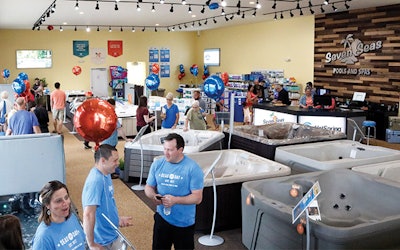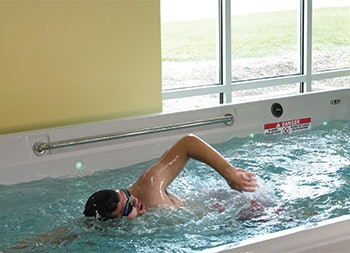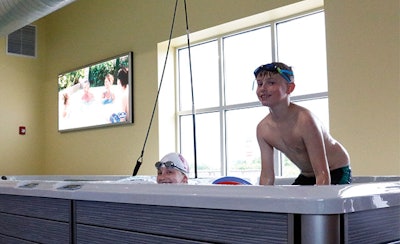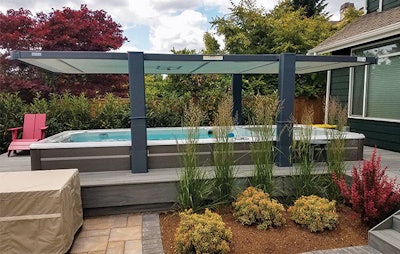
 Courtesy Seven Seas
Courtesy Seven Seas
Beginning around mid-March, most of America went into a mandatory quarantine designed to slow the spread of the worst global pandemic in a hundred years. Stores shut their doors, offices emptied, and the economy went into a deep freeze. For most backyard retailers, that meant business slowed to a crawl or stopped altogether.
We called Ron Perkins a couple of weeks into his isolation, and it immediately became apparent he wasn't sitting around during the lockdown binging on Netflix and eating Chef Boyardee straight out of the can like so many of us. Rather, he was using the time to prepare for the day, hopefully soon, when the five Seven Seas Pools & Spas stores he manages in and around Pittsburgh would throw open their doors to customers and return to something approaching normalcy.
Perkins was spending a lot of this prep time thinking about how to sell more swim spas, a product line he believes is poised to go back to flying off showroom floors once the stay-at-home orders are eased or lifted. For some dealers, though, swim spa purchases haven't always matched this potential, and Perkins thinks he's figured out how to fix that.
"The biggest problem I see is that everybody wants all their salespeople to sell them," he says. "But it is such a specialty product that there should be one person in the store selling it, maybe two if you've got a big store. I mean, if you don't have someone who knows the product front and back and they just try to sell it like a hot tub, they're going to miss the mark. And they're going to lose you money.
"The salesperson can't just say, 'Here it is in our showroom. Do you want it?' Then they'll tell them to get a crane, figure out where they want it and then call when you want them to bring it on the truck."
Perkins approaches potential sales differently: He treats swim spa shoppers like inground pool shoppers, focusing on every aspect of the sale, delivery and installation.
"First, we have an exploratory phase where we figure out everything they want out of the unit, and choose the size, making sure it will be a good fit. Then we can help them lay out their backyards by connecting them with designers and contractors, basically serving as a point person to help guide things," he says. Without that level of help from a knowledgeable seller, some people will buy units that just don't make any sense for a property, either physically or aesthetically. Perkins bailed out one such customer in the Squirrel Hill neighborhood of Pittsburgh last year.
"Half the guy's yard was going to be taken up by this unit he wanted, so we brought in a designer we work with and chose a smaller one and laid the yard out in a way that made sense and looked much better," Perkins says. "He dropped over $130,000 on that small backyard, and it looks great."
Scenes such as this are rarer during a pandemic, but Perkins knows the country and the world will move beyond this, and when it does, he is ready to move some merchandise by repeating this hands-on selling approach.
"When the market does open again, this is going to be the best industry to be a part of," he says. "And swim spas will be a big part of that."
 A wet test with kids can be particularly effective with swim spas. (Courtesy Seven Seas)
A wet test with kids can be particularly effective with swim spas. (Courtesy Seven Seas)
WAITING AND HOPING
John Antilla, vice president and general manager for Aqua Quip in Seattle, is also bullish on swim spas. The company's nine stores were doing brisk business in them last year, and he thinks sales have even more room to improve. Before that happens, though, governors must give the all-clear and allow shoppers to shop again, and sellers must educate those shoppers about a product many of them misunderstand.
"It fits a lot of people's needs," Antilla says, "but if you mention it to most people, they'll say, 'Oh, yeah, I know what that is. It's the thing where you swim against the current.' But they're so much more than that! A swim spa is an exercise vessel for people with knee and joint problems, and it's good for helping seniors with their balance during exercise. It's also a great entertainment center — you can have five kids in there all enjoying it just like you would a pool in the summer. Then in the winter, you can kick it up to whatever temperature you want to make it into a giant hot tub, if that's the kind of entertaining you're doing."
Try doing that with a pool. Even industry insiders can underestimate this versatility. Norm Coburn, who owns three New England Spas stores in Massachusetts, says he used to think of swim spas as primarily an exercise product bought by families with competitive swimmers. "But in reality, it's more of a backyard play pool around here," he says. "That's what people are buying, and our growing understanding of who the buyer is has really helped us focus our efforts to sell more."
Coburn says 2019 was his best for swim spas in several years, and has invested in showroom space to leverage that strength.
"We set up a showroom specifically to demo swim spas for people who want to try them out, and we carved out a 3,000-square-foot space in our new operations facility and decked it all out," he says.
The new display area has three swim spas, a regular hot tub to take the chill off, a high-end sauna, an ADAcompliant bathroom with a shower and one unique touch that always leaves an impression on visitors.
"We put a bathing-suit dryer in there like you'd find in a health club, and people really get a kick out of that," he says.
 This gorgeous installation from Aqua Quip displays clearly the reasons for swim spas' consumer appeal: exercise, relaxation and a pool environment in one package. (Courtesy Aqua Quip)
This gorgeous installation from Aqua Quip displays clearly the reasons for swim spas' consumer appeal: exercise, relaxation and a pool environment in one package. (Courtesy Aqua Quip)
A NEW NORMAL BEGINS TO TAKE SHAPE
Like Perkins, Coburn closed his New England Spas retail stores when the governor issued a stay-at-home order, though the operations department has been working at normal capacity on service calls — with a few social distancing measures thrown in, naturally. The retail salespeople aren't idled, though, and have been using showroom space to check in on existing customers over the phone and to meet prospects in person by appointment.
"They're also getting good at virtual sales calls, including FaceTiming with customers so we can do site visits of their homes," Coburn says. Some of his customers are even doing curbside supply pickups, and everybody is keeping their hands and the demo tubs cleaner than ever.
Coburn is confident some of these practices that were born out of necessity will continue postpandemic. "We've been trying to do virtual selling for a long time prior to this," he says. "We know that in the old days customers could go to home shows and visit eight competitors in an afternoon, and make comparisons and informed decisions. That's not happening anymore. Now, customers are doing all that online. So our digital presence and our mobile websites have to be up to par in order to capture a shopping experience that's now virtual.
"I don't think curbside delivery will stick around — I don't know how important that is — but I think we're certainly learning, under different circumstances and different environmental conditions, how to serve our customers."
In Seattle, Aqua Quip has made similar changes to its business model with curbside pickup, free shipping and virtual presentations. But they still have people trickling into their stores, which are deemed essential by the state of Washington because of the sanitation and safety aspects of the business. It's helpful to be allowed to stay open, but it does come with a cost. "Certain people are pissed that we're open," Antilla says, wearily. "It's just difficult. There's no easy answer."
For now, Antilla and Aqua Quip are doing their best to cope with the novel coronavirus, and are looking forward to the day when we get a clearer idea of what a new-normal life in backyard retail can look like. He doesn't have a crystal ball, but he thinks he sees a future where homeowners will be looking to invest in their homes and family lives.
"People are having to spend time at home these days, and may be looking at better ways to recreate. The guy down the street with the pool and the kids splashing around every day while he's sitting around watching The Flintstones for the tenth time, he might be thinking, I need one of those in my backyard."
Antilla is keenly aware that a lot of families will have extra money to spend due to scrubbed vacation plans, though he is careful to avoid using the term "staycation."
"Cancelled family trips to Europe or Hawaii are not something to celebrate," he says. "I don't think you have to point out negatives to get people interested. We just have to point out what it is and how to use it and how it benefits a family. Don't have the attitude of, 'Why don't you spend your money on this since you can't take that trip anymore?'"
DEMAND IS BUILDING, SOON PEOPLE WILL BE BUYING
Changes to travel plans are not the only reason families will be in the mood to spend money close to home later this year and into 2021. For many, the sheer quantity of the quality time with family has them searching for new ways to entertain themselves and their kids.
That's what Perkins believes, and that belief stems from his personal quarantine experience, which has included a lot of time in his own backyard.
"My family and I have been in our hot tub pretty much every day since this has been going on," he says. "We post funny stories and talk about our family time and share it with our friends and family on social media. The typical response has either been 'I hate you' if they don't have one or 'I need one of those!' They're both really the same thing."
He figures those feelings are universal.
"The one thing from this whole event that's going to happen is that people will be looking to invest in their homes, and especially in family time at the home," he says. "Having things to do with their kids is becoming more and more of a focus during the pandemic. It's like, 'Hey, what other opportunities are out there?'"
Norm Coburn sees a similar scenario playing out at the three New England Spas stores he owns in eastern Massachusetts, as pent-up people are freed to relieve the pent-up demand that's been building for products like swim spas.
"We fully expect that once the fear is over, we're going to see a surge of interest," he says. "That phrase — pent-up demand — my colleagues use all the time, and I've always sort of scoffed at it because I never really believed in it. But now I'm going to use it in all seriousness: I really do think there will be a groundswell of pent-up demand, and I can't wait to see it."











































